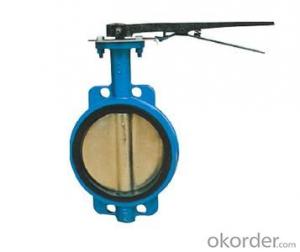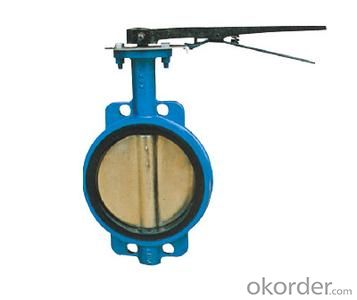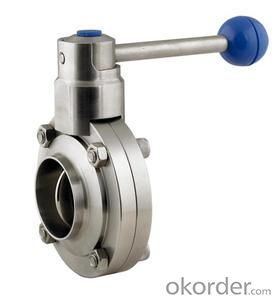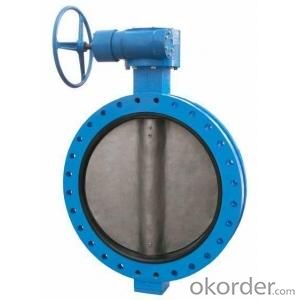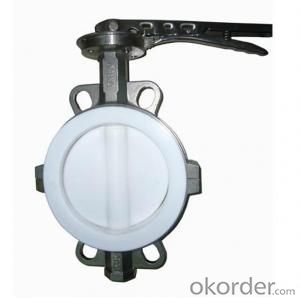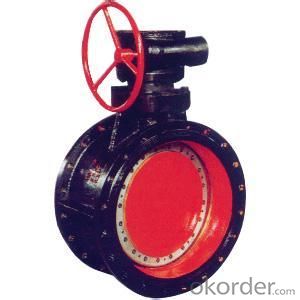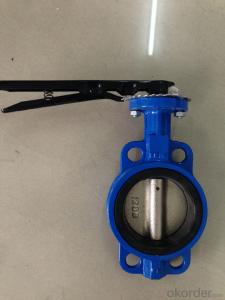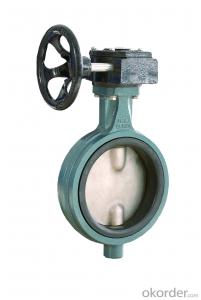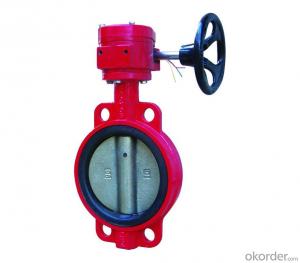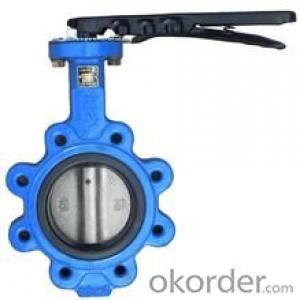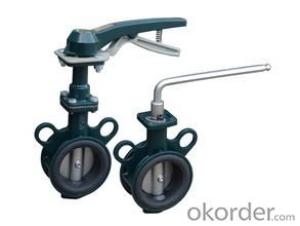ALLOY STEEL BUTTERFLY VALVE DN25-DN1200 BG290
- Loading Port:
- Shanghai
- Payment Terms:
- TT OR LC
- Min Order Qty:
- 1 pc
- Supply Capability:
- 10000 pc/month
OKorder Service Pledge
OKorder Financial Service
You Might Also Like
Specifications
Long service life, standing the test of tens thousands opening/closing operations
Butterfly Valve
Packing & Delivery:
Packing: plywood box or according to specific customer needing .
suitable for long-time sea shipment
Delivery: within 15-30days after receipt of at sight L/C or 30% as advance payment by T/T
Materials:
Body: aluminum, cast iron, ductile iron, carbon steel, stainless steel
Disc: cast iron, ductile iron, carbon steel , stainless steel
Stem: carbon steel, stainless steel
Seat: EPDM, PTFE, NBR
Specifications
Size: DN25-1200 (1”-48”)
Pressure: PN10/16( 150/200 PSI)
Actuator: handle/gear box /pneumatic /electric
Standard: API, ASTM, ANSI , DIN, BS, JIS ,ISO approved
End connection: wafer type, flange type, lug type
Features:
1.Unique stem hole design in the disc ensures a dry stem journal;
2.360 degree polished disc assures positive on-off;
3.Long service life, standing the test of tens thousands opening/closing operations;
4.Bubbles-tight sealing with no leakage under the pressure test;
5.Wide selection of materials , applicable to various medium
- Q: What is the difference between carbon steel and stainless steel pipes?
- The main difference between carbon steel and stainless steel pipes lies in their composition and rust resistance properties. Carbon steel pipes are primarily made of iron and carbon, making them less resistant to corrosion and prone to rusting. On the other hand, stainless steel pipes contain chromium, which gives them excellent rust resistance and durability. This makes stainless steel pipes ideal for use in environments where corrosion is a concern, such as in plumbing systems and industrial applications.
- Q: How are steel pipes used in the agricultural sector?
- Steel pipes are commonly used in the agricultural sector for various purposes such as irrigation, drainage, and livestock handling. They are used to transport water from a source to fields, as well as to distribute water evenly across crops through irrigation systems. Steel pipes also help in draining excess water from fields and preventing waterlogging. Additionally, they are utilized for constructing fences, gates, and cattle handling facilities, ensuring the safety and containment of livestock.
- Q: What are the different methods of pipe threading for steel pipes?
- There are several methods of pipe threading for steel pipes, including manual threading, machine threading, and roll grooving. Manual threading involves using a hand-held die and a pipe vise to create threads on the pipe. Machine threading uses power-driven threading machines that can quickly and accurately create threads on steel pipes. Roll grooving, on the other hand, involves using a specialized machine that forms a groove on the pipe, eliminating the need for threading and allowing for easy installation of pipe couplings or fittings. Each method has its advantages and is chosen based on factors such as pipe size, project requirements, and efficiency.
- Q: How do steel pipes handle soil movement?
- Steel pipes are able to handle soil movement quite well due to their inherent strength and durability. The rigid nature of steel pipes allows them to withstand ground shifting, settling, and other soil movements without significant deformation or damage. Additionally, steel pipes can be reinforced with additional supports and anchoring systems to further enhance their ability to handle soil movement.
- Q: Can steel pipes be used for hydraulic systems?
- Yes, steel pipes can be used for hydraulic systems. Steel pipes are commonly used in hydraulic systems due to their high strength, durability, and resistance to high pressure and temperature. They provide reliable performance and are suitable for a wide range of hydraulic applications.
- Q: Can steel pipes be used for natural gas processing plants?
- Yes, steel pipes can be used for natural gas processing plants. Steel pipes are commonly used in the oil and gas industry due to their strength, durability, and resistance to high pressure and extreme temperatures. They provide a reliable and efficient means of transporting natural gas within processing plants.
- Q: Can steel pipes be used for fencing or railing?
- Yes, steel pipes can be used for fencing or railing. Steel pipes are strong, durable, and resistant to corrosion, making them a suitable option for fencing or railing applications. They can provide a sturdy and secure barrier while also offering an aesthetically pleasing look.
- Q: Are steel pipes suitable for desalination plants?
- Yes, steel pipes are suitable for desalination plants. Steel pipes offer several advantages that make them a suitable choice for desalination plants. Firstly, steel pipes are highly resistant to corrosion, which is crucial in desalination plants where the presence of saltwater can be highly corrosive. The corrosion resistance of steel pipes ensures the longevity and durability of the infrastructure, reducing maintenance and replacement costs. Secondly, steel pipes have high strength and can withstand high-pressure conditions, which are often required in desalination plants. The ability of steel pipes to handle high-pressure water flow without any deformations or leaks ensures the efficient and reliable operation of the desalination process. Furthermore, steel pipes have excellent heat resistance properties, making them suitable for desalination plants that often involve heat-intensive processes such as distillation or reverse osmosis. Steel pipes can withstand high temperatures without any structural damage, ensuring the safe and efficient transfer of heated water or steam. In addition, steel pipes are readily available and have a wide range of sizes and specifications, allowing for flexibility in design and construction of desalination plants. This availability and versatility make steel pipes a cost-effective choice for desalination projects. Overall, due to their corrosion resistance, high strength, heat resistance, availability, and cost-effectiveness, steel pipes are highly suitable for desalination plants and are widely used in the industry.
- Q: What kind of argon arc welding wire is used for 16Mn steel pipe?
- 16Mn steel weldability is very good, general use TIG with J50 welding wire, hand arc welding with J506, J507 and other welding rod
- Q: How are steel pipes used in the construction of underground parking garages?
- Steel pipes are commonly used in the construction of underground parking garages for various purposes. They serve as structural supports, providing stability and strength to the overall structure. Steel pipes are also used for drainage systems, allowing for efficient disposal of water and preventing flooding. Additionally, they are utilized for the installation of utilities such as water, gas, and electrical lines, ensuring easy access and maintenance. Overall, steel pipes play a crucial role in the construction of underground parking garages by offering durability, functionality, and reliability.
Send your message to us
ALLOY STEEL BUTTERFLY VALVE DN25-DN1200 BG290
- Loading Port:
- Shanghai
- Payment Terms:
- TT OR LC
- Min Order Qty:
- 1 pc
- Supply Capability:
- 10000 pc/month
OKorder Service Pledge
OKorder Financial Service
Similar products
Hot products
Hot Searches
Related keywords
